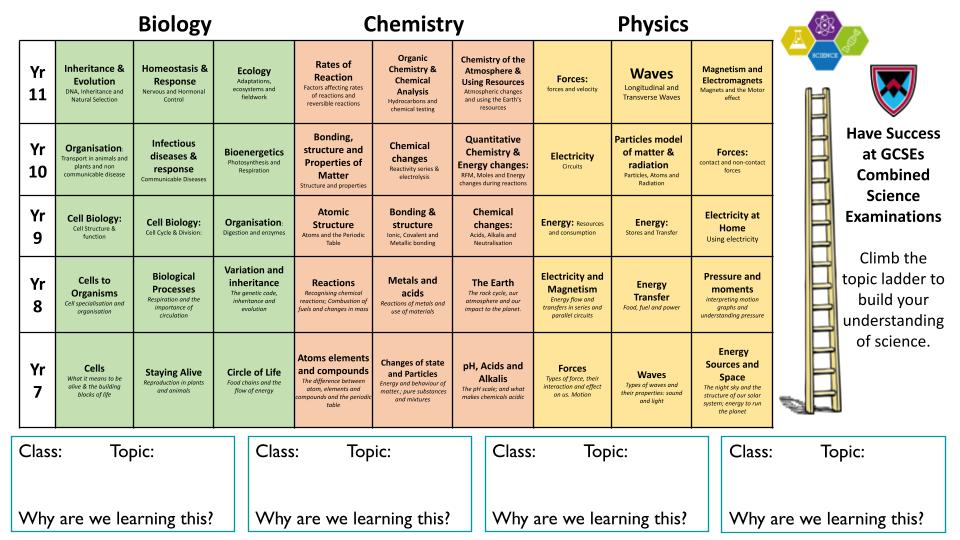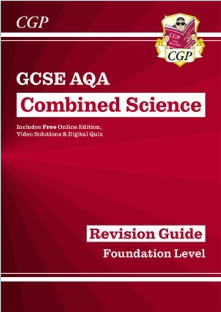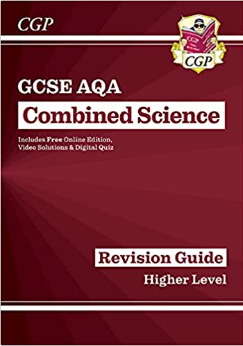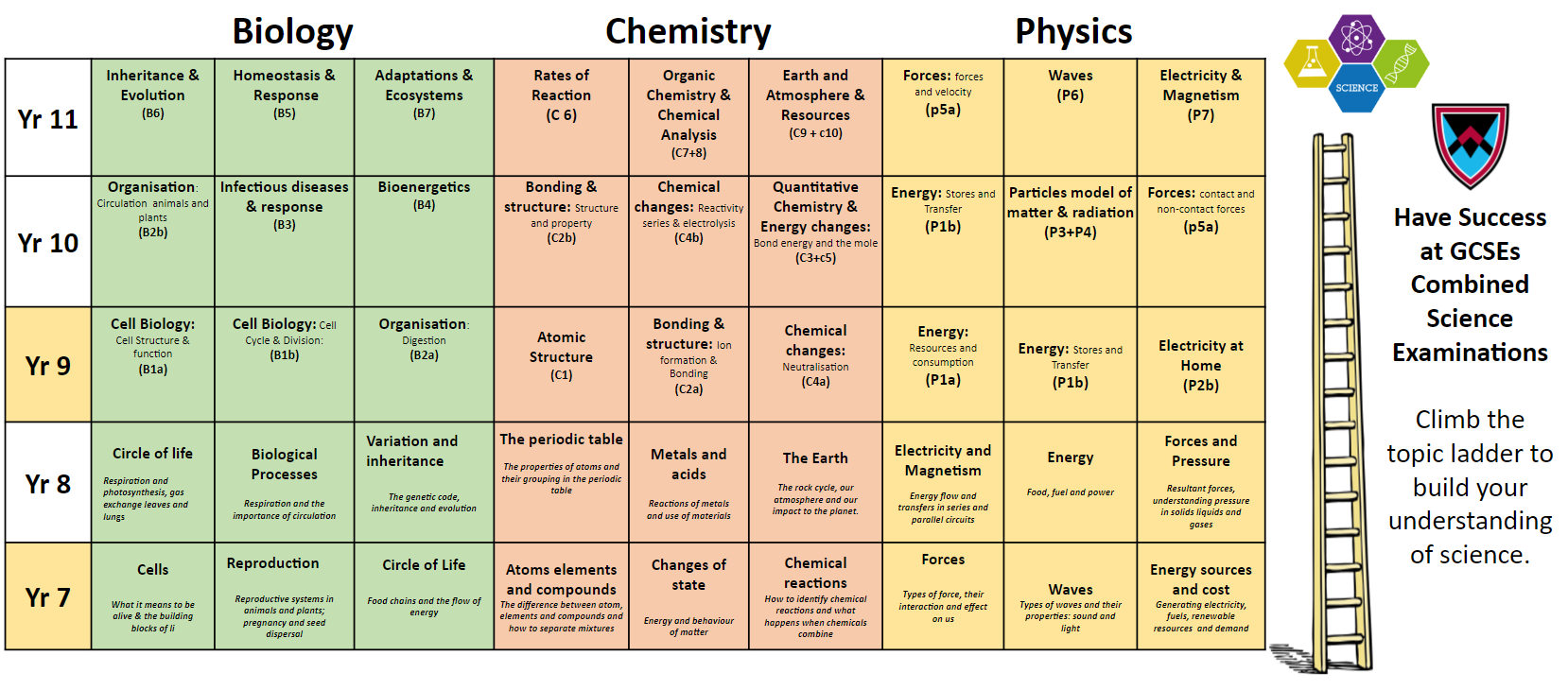Science
Vision
Inclusivity and progress for all learners through the provision relevant and contextualised curriculum; where the development of scientific skills, knowledge and understanding is underpinned by practical enquiry and application; empowering learners to question like scientists and make informed decisions about their lives and the environment…
The Science Curriculum @ Marlwood

KS3 Year 7- 9
Our KS3 studies in science aim to:
- Develop scientific knowledge and conceptual understanding through the specific disciplines of biology, chemistry and physics
- Develop understanding of the nature, processes and methods of science through different types of science enquiries
- Are equipped with the scientific knowledge and understanding to successfully access GCSE studies in combined science (double award) or separate science (biology, chemistry and physics
Knowledge organisers / vocabulary list
- Under development
Useful Weblinks/additional reading
https://www.bbc.co.uk/bitesize/subjects/zyxyvwx - KS3 BBC bitesize science
http://www.darvill.clara.net/myon.htm
https://docbrown.info/ks3science.htm
https://www.mathsmadeeasy.co.uk/science-ks3-year-7.htm
How to support your child
Discuss what they are doing in science at the moment and explore key terminology.
Encourage them to make use of suggested websites.
Help them practice the spelling and use of scientific vocabulary
Help/encourage them to prepare for the end of unit tests.
KS4 Curriculum Year 10-11
Combined science:
Exam Board: AQA
Exam weighting: 100% Examination
Assessment:
Students will follow a linear course structure and complete six equally weighted exams at the end of year 11, including the assessment of required practical activities. Students must study all three Sciences and will receive two GCSE grades that combine all three Sciences into an average.
Content:
- In Physics; Forces, Waves, Magnetism and Electromagnetism, Energy, Electricity, Particle Model of Matter and Atomic Structure (Nuclear).
- In Biology; Cell biology, Organisation, Infections and Response, Bioenergetics, Homeostasis and Response, Inheritance, Variation and Evolution, Ecology.
- In Chemistry; Atomic structure and the Periodic Table, Bonding, Structure and the Properties of Matter, Quantitative Chemistry, Energy and Chemical Changes, The Rate and Extent of Chemical Change, Chemical Analysis, Organic Chemistry, Chemistry of the Atmosphere and Using Resources.
Skills:
Students will gain skills in the following areas:
- Scientific skills – students will complete a range of prescribed experiments to develop their practical skills and awareness of the scientific method
- Literacy – the explanation of observable and non-observable scientific phenomena ∙ Numeracy – being able to select, reorganise and use a range of equations, use ratios to calculate chemical masses, and the uses of statistics in the animal kingdom.
What are the benefits of studying this course now and for the future?
- An understanding of the world around us
- Awareness of the role Science plays in the exploration of the universe, the development of new technologies and the understanding of the natural world and environment
- Using both numeracy, literacy and investigative skills to explore the scientific world
- Appreciation of how developments and discoveries over time shape our world.
Separate science:
(Option route) from year 10 - increased breadth across the three science disciplines.
NB* separate is not an option subject and therefore does not benefit from additional curriculum time
Exam Board: AQA
Exam weighting: 100%
Assessment:
Students will follow a linear course structure and complete six equally weighted exams at the end of year 11, including the assessment of required practical activities. Students must study all three Sciences and will receive three GCSE grades for each of the separate sciences of Biology, Chemistry and Physics.
Content:
- In Physics; Forces, Waves, Magnetism and Electromagnetism, Energy, Electricity, Particle Model of Matter and Atomic Structure (Nuclear), Space Physics.
- In Biology; Cell biology, Organisation, Infections and Response, Bioenergetics, Homeostasis and Response, Inheritance, Variation and Evolution, Ecology.
- In Chemistry; Atomic structure and the Periodic Table, Bonding, Structure and the Properties of Matter, Quantitative Chemistry, Energy and Chemical Changes, The Rate and Extent of Chemical Change, Chemical Analysis, Organic Chemistry, Chemistry of the Atmosphere and Using Resources.
Skills:
Students will gain skills in the following areas:
- Scientific skills – students will complete a range of prescribed experiments to develop their practical skills and awareness of the scientific method
- Literacy – the explanation of observable and non-observable scientific phenomena,
- Numeracy – being able to select, reorganise and use a range of equations, use ratios to calculate chemical masses, and the uses of statistics in the animal kingdom.
What are the benefits of studying this course now and for the future?
Studying separate science qualifications in biology, chemistry and physics predominantly for those students who demonstrate a keen interest in the sciences The programme of study is best suited for those students with a natural aptitude within science and maths.
- An understanding of the world around us at a greater depth than the combined science route.
- Awareness of the role Science plays in the exploration of the universe, the development of new technologies and the understanding of the natural world and environment
- Using both numeracy, literacy and investigative skills to explore the scientific world
- Appreciation of how developments and discoveries over time shape our world.
- May benefit some student considering a career in science or medicine
Knowledge organisers / vocabulary list
Career pathways
- Doctor
- Electrician
- Engineer
- Food Technologist
- Government Advisor
- Laboratory Assistant
- Laboratory Technician
- Microbiologist
- Midwife
- Nurse
- Oceanographer/Marine Biologist
- Physiotherapist
- Radiologist
- Research Scientist
- Science Writer
- Software Developer
- Sports Scientist
- Surgeon
- Sustainability Consultant
- Teacher
- Veterinary Medicine
- Web Developer
Useful Links and resourcing
CGP GCSE revision guides:


Grade 9-1 GCSE Combined Science: AQA Revision Guide with Online Edition – Higher (CGP GCSE Combined Science 9-1 Revision) ISBN: 9781782945598 Grade 9-1 GCSE Combined Science: AQA Revision Guide with Online Edition – Foundation (CGP GCSE Combined Science 9-1 Revision) ISBN: 9781782945604 Grade 9-1 GCSE Chemistry: AQA Revision Guide – ISBN: 9781782945574 Grade 9-1 GCSE Biology: AQA Revision Guide – ISBN: 9781782945567 Grade 9-1 GCSE Physics: AQA Revision Guide – ISBN: 9781782945581
Support for students and parents
https://www.bbc.co.uk/bitesize/examspecs/z8r997h - AQA GCSE BBC bitesize
https://www.educake.co.uk/ - Homework & quizzes to improve knowledge recall.
https://www.freesciencelessons.co.uk/videos
https://www.primrosekitten.com
https://app.senecalearning.com
https://www.youtube.com/channel/UC-TM-z1-tmX1iK_H4SxVhww - Required Practical videos
https://www.my-gcsescience.com/
https://gradegorilla.com/gcse-physics-revision-questions.php - Physics
Further resources including practice exam papers, revision cards and 10 minute tests can also be purchased directly from the CGP website:
https://www.cgpbooks.co.uk/Parent/books_gcse_science


